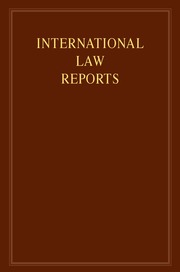No CrossRef data available.
Article contents
Ezokola v. Canada (Minister of Citizenship and Immigration
Published online by Cambridge University Press: 01 January 2021
Abstract
Treaties — Interpretation — United Nations Convention Relating to the Status of Refugees, 1951 — Article 1F(a) — Refugee protection status — Whether exclusion from definition of refugee under Article 1F(a) on basis of complicity in international crimes
International criminal law — International crimes — Crimes against humanity — Individual criminal liability for complicity — Complicity in international crimes committed by a government — Contribution-based test to complicity — Voluntary, significant and knowing contribution to international crimes committed by a government — Complicity by association or passive acquiescence
Sources of international law — Rome Statute of the International Criminal Court, 1998 — Article 25(3)(d) on common purpose liability — Ad hoc tribunals’ jurisprudence on joint criminal enterprise — Whether these modes of commission of international crimes also capturing complicity by association, rank or passive acquiescence — Nexus requirement between individual’s conduct and group’s criminal activity
Relationship of international law and municipal law — Approach taken by other State Parties to concept of complicity — Whether Canadian approach needing rearticulation — Interpretation of Article 1F(a) of United Nations Convention Relating to the Status of Refugees, 1951 excluding complicity by association or passive acquiescence — The law of Canada
Keywords
- Type
- Case Report
- Information
- Copyright
- © Cambridge University Press 2020




